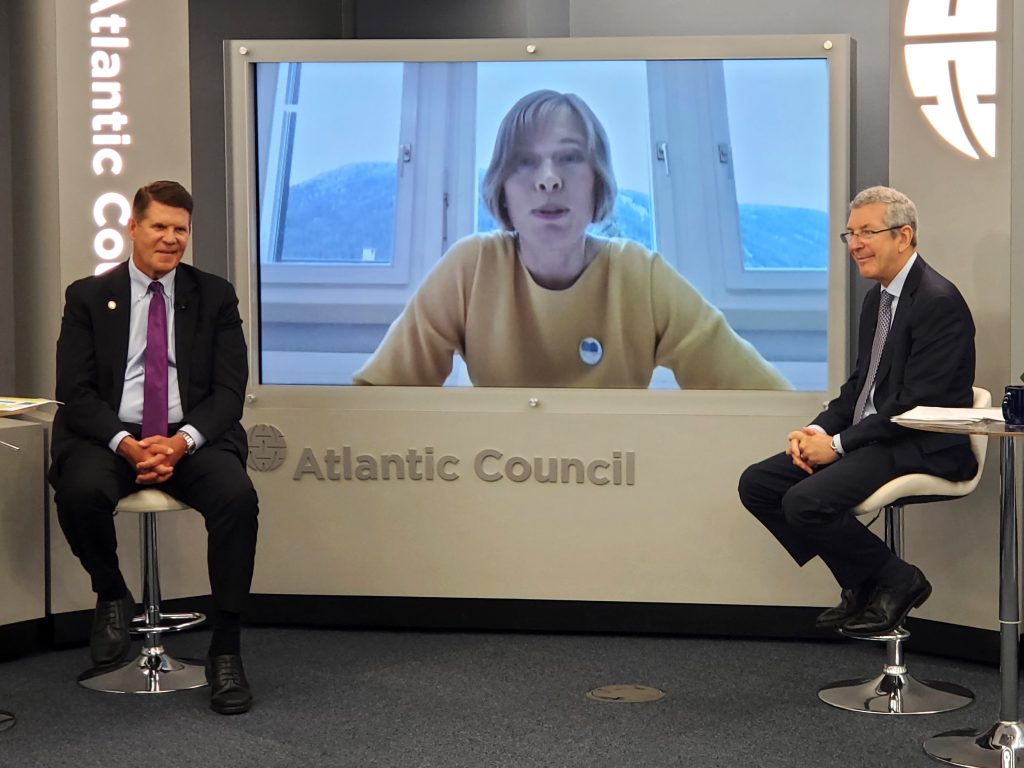Keith Krach and former Estonian president Kersti Kaljulaid will lead nonpartisan commission of international leaders to develop global tech security strategy to counter techno-authoritarianism
Washington, DC, May 26, 2022 – The Atlantic Council and Krach Institute for Tech Diplomacy at Purdue announce the launch of the nonpartisan Global Tech Security Commission to safeguard freedom from technological authoritarianism. The Commission is co-chaired by Keith Krach, chairman and co-founder of the Krach Institute for Tech Diplomacy at Purdue and former US Under Secretary of State; and Kersti Kaljulaid, former president of Estonia. It will develop a global tech security strategy designed to rally and unify like-minded countries, leverage the innovation and resources of the private sector, and build a global network to develop, protect, and adopt trusted technologies.
The Global Tech Security Commission unites an international network of multi-sector stakeholders and has the support of lawmakers and private-sector leaders. It comes at a time when the United States is working to unite its Transatlantic and Indo-Pacific allies and partners across a range of critical technology issues in the face of rising authoritarianism around the world.
“The key to securing freedom for the next generation is securing technology. Tomorrow’s tech must be trusted tech developed and protected by a Global Trust Network of like-minded countries, companies, and individuals who respect the rule of law, human rights, labor practices, national sovereignty, and the environment,” said Keith Krach. The former US Under Secretary of State and CEO of DocuSign and Ariba continued, “I am honored to be joined in this critical mission by Kersti Kaljulaid, a widely-respected transformational leader, and a distinguished group of multinational, multi-sector visionaries.”
“We will win,” Kaljulaid said at the Commission’s May 25 announcement event, “But for us to safely mine the technology pool created by the great minds of our private sector companies, we have to have standards, agreements.” She concluded, “Nobody must be able to blow up what we trust in technology, and for that indeed we need the Global Tech Security Commission.”
Three factors make the Commission’s scope uniquely strategic for countering techno-authoritarian threats. First, the Commissionwillfocus on in-depth strategies in 17 critical tech sectors and integrate them into an overarching Global Tech Security Strategy. Second, the scope will be global and private-sector led, with commissioners from international companies and institutions representing more than a dozen countries as part of democracies’ common effort to compete in emerging technologies. Third, while previous commissions have primarily focused on analysis of problems with recommendations limited to defensive policies, the Global Tech Security Commission will integrate offensive and defense strategies while beginning to build the Global Tech Trust Network, define overarching Tech Trust Standards, and accelerate the adoption of trusted technology.
“The Atlantic Council has for six decades rallied democratic allies and partners around the world, and our new era of technological threats and opportunities calls for innovative approaches,” said Frederick Kempe, President and CEO of the Atlantic Council. “The Krach Institute’s new model of transformational tech diplomacy based on the ‘Trust Principle’ makes it the ideal partner for the Atlantic Council and the Global Tech Security Commission.”
The coordinator for the effort will be David Shullman, Atlantic Council Global China Hub senior director and former Deputy National Intelligence Officer for East Asia.
The Global Tech Security Commission was formally announced at a public event on May 25—featuring a headline fireside chat between Keith Krach and U.S. Under Secretary of Commerce Alan Estevez and a special appearance from President Kaljulaid. Shullman, along with Bonnie Glick, Krach Institute for Tech Diplomacy at Purdue director and former deputy administrator and chief operating officer of the US Agency for International Development, offered remarks.
To keep up with the Commission’s latest developments, subscribe to the Global China Hub and Krach Institute for Tech Diplomacy at Purdue, and visit GTSCommission.org.
About the Atlantic Council
Driven by our mission of “shaping the global future together,” the Atlantic Council is a nonpartisan organization that galvanizes US leadership and engagement in the world, in partnership with allies and partners, to shape solutions to global challenges. The Atlantic Council’s Global China Hub researches and devises allied solutions to three of the greatest challenges posed by China’s rise: 1) China’s growing influence on countries, global institutions, and democratic values; 2) the global ramifications of political and economic change in Xi Jinping’s China; and 3) China’s drive to dominate emerging technologies and consequences for individual rights and privacy.
About the Krach Institute for Tech Diplomacy at Purdue:
The nonpartisan Krach Institute for Tech Diplomacy at Purdue is the world’s preeminent institution focused on Tech Statecraft, a new model of diplomacy that bridges the high-tech sector with the foreign policy and national security sectors to ensure trusted technology is used to advance freedom. The Krach Institute for Tech Diplomacy is a 501(c)(3) that leverages Purdue’s strength in innovation, deep expertise in technology, and global prowess in educating transformational leaders. It focuses on rallying our allies, leveraging the innovation of the private sector, and amplifying democratic values based on trust. For more information, go to techdiplomacy.org. Follow the Krach Institute for Tech Diplomacy at Purdue on Twitter, LinkedIn, and YouTube.
Please contact press@atlanticcouncil.org and techdiplomacy@prf.org for media inquiries about the Global Tech Security Commission.
